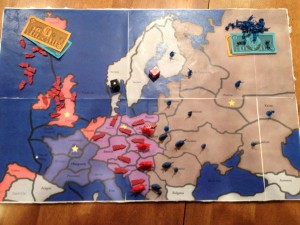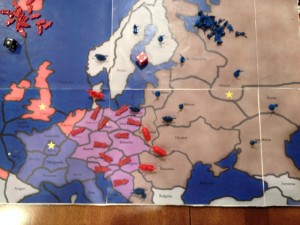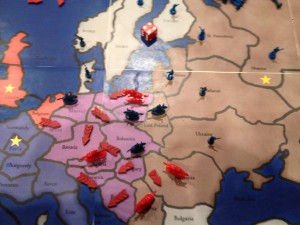The current attrition based combat mechanics for Clash of Empires have been well-received by players, but player feedback suggests several problems with the game which could be fixed by changing the combat mechanics. The combat mechanics require a large number of pieces to be placed on the board, which has led to undesirably long setup times. The number of pieces also caused problems during the game because of the time spent on moving the pieces and making sure that they stay upright. Another problem with the combat mechanics is that they do not work well in 2 player games because it involves attacking with as many units as possible without any need to make strategic decisions. This is a similar problem that certain games such as Risk have as well. This was not an issue in games with more players since attacking one player with as many units as possible leaves you vulnerable to attack by other players. In order to solve the issues with too many pieces on the board an a lack of strategy in 2 player games, I will be testing out new combat rules that I will describe below.
Each player will start off with 4 generals on the board and 40 unit tokens, which will not be placed on the board. Each turn, a player may move each general one space. Combat will be initiated when a general moves into an enemy territory and will be resolved with the help of the unit tokens. During combat, each player secretly plays a certain number of unit tokens and the player who plays the highest number of unit tokens wins. However, players will have to be careful when playing unit tokens because unit tokens played during a battle cannot be played in another battle until the following round. Also, to prevent players from being too reckless when attacking, each player will lose some unit tokens during the battle. To further encourage players to play unit tokens wisely, losing a round of combat will force you to lose additional unit tokens and retreat, and successfully attacking will give a player victory points in addition to giving players control of the territory they attacked.
Because each player will only have a few units on the board, setup will be significantly faster and players will not spend to much time moving pieces around. Combat will be more interesting, and will not be an automatic win for a player with more units because of the need to secretly allocate troops during each battle. The game also has the potential to take significantly more time because of the time players could spend figuring out how to best allocate their troops.


